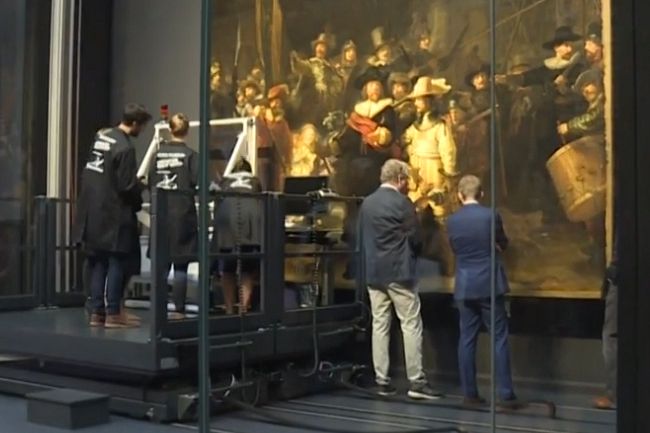While artificial intelligence has been an important tool in gaining a better understanding of our world, it's imperative that we learn more from it, writes Paul Budde.
IN 2002, computer scientist, physicist and businessman Stephen Wolfram published his book, A New Kind of Science.
Rather than looking at mathematics as the solution to unravel the mysteries of the world and the universe, Wolfram looked at how systems work and concluded that they do follow certain patterns to eventually create a particular outcome. There are plenty of examples in the world around us, especially if we look at nature. We see some of the most beautiful patterns in our brains, birds, butterflies flowers, galaxies and so on. The same applies to art and music but we also see them in the golden ratio, prime numbers and the digits of pi.
Wolfram worked on cellular automaton. At a one-dimensional cellular automaton, there are two possible states (labelled 0 and 1) and the rule to determine the state of a cell in the next generation depends only on the current state of the cell and its two immediate neighbours. He figured out how that could be applied using computer programming and was able to create systems that delivered remarkable outcomes which could not be formulated in an equation or algorithm.
However, it is only in the last decade that he was able to develop this further with the assistance of artificial intelligence (AI) or more precise machine learning (ML) and, even more importantly, neural nets. The latter are computing systems that are at least vaguely inspired by the biological neural networks.
While on a micro level (in our world) there is chaos, on a macro level, however, it looks like there are systems and patterns and very often they are very beautiful and show harmony. To learn more about the underlying systems will provide us with better guidelines on how to best understand the chaotic environments which is the reality that we must deal with. Following Wolfram’s work, it makes sense that what is underlying our world, our universe could well be based on simple systems.
It reminds me of some of the smart city work I have been involved in. Working with students in hacks. Collecting data from totally different systems and bringing them together and amazingly, we start to see very interesting patterns/systems on how a city operates.
Another interesting example was revealed a few weeks ago. Operation Night Watch shows what a computer system combining imagination, resources, technical virtuosity and mastery of a powerful technology can achieve.
Painted in 1642, Rembrandt’s Night Watch was in 1715 cut on all four sides to fit in a new spot in Amsterdam’s Town Hall (now the Royal Palace). The cut off pieces were lost. However, there was a copy of the full painting made by Gerrit Lundens shortly after Rembrandt had finished it but it was clear that it was not as good as the one from the master himself. Nevertheless, that painting showed the missing bits. With the assistance of AI, these pieces have been reconstructed.
The reconstruction was based on the system approach. First, AI was used to teach the computer what Lundens’ style of painting was: his brush strokes, techniques and so on. Then, through AI, the system was fed with information based on Rembrandt’s techniques and his way of work was programmed into the computer as the desired outcome. The result is just stunning; Wolfram will be extremely proud of that.
In the end, we are part of all the (beautiful) patterns that we see in the universe so why would the sub-systems be so different? I agree with Wolfram that we might need a totally different approach to understanding these systems and replicating them. We might be able to put all the puzzle pieces together and get a better picture of the full underlying/overarching system. What we see as chaotic and unpredictable could well become clearer once we understand more and more of the underlying systems.
Now on to everyday reality — and things that really matter in the here and now.
Let us stick to the knowns. We unravel more and more problem areas to get a better understanding of the environment/world/universe we live in. We have already done a lot of good work here. However, we fail to act upon what we are learning, so we are ignoring the outcomes rather than applying them for the good of all. Climate change is a classic example here.
We use ML, big data and who knows what else we develop to create a better world. If we fail to implement the lessons that we are learning from using these tools, then what is the point?
This is something that greatly frustrates me — we seem to lack the will to grab that knowledge and act upon systems as we are learning to understand them.
We also know that we are social beings, so we do depend on each other. There are systems that also underlie our communities – and again, we know them very well – but also here we fail to act upon them.
It is not difficult to see communities that do live in harmony and thrive; that is a good working system. What we are seeing over the last 50 years or so is that these communities/societies are disturbed and that indicates that social systems are failing. We know what is needed to make it work, but again, we fail to implement the solutions.
Developments in smart cities systems based on grassroots developments are a good way to improve our communities.
Paul Budde is an Independent Australia columnist and managing director of Paul Budde Consulting, an independent telecommunications research and consultancy organisation. You can follow Paul on Twitter @PaulBudde.
Related Articles
- How our economy is like an out of control AI
- The future in the war against cybercrime — machine learning and AI
- Artificial Intelligence: Will we gain more or lose by investing in AI?
 This work is licensed under a Creative Commons Attribution-NonCommercial-NoDerivs 3.0 Australia License
This work is licensed under a Creative Commons Attribution-NonCommercial-NoDerivs 3.0 Australia License
Support independent journalism Subscribe to IA.














